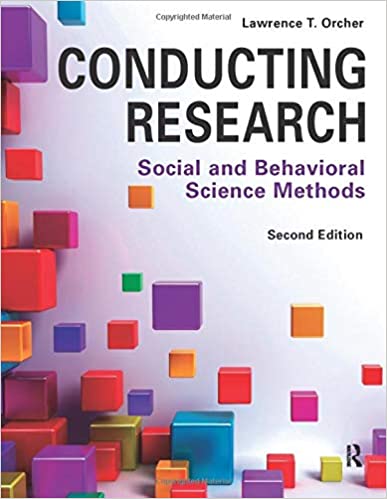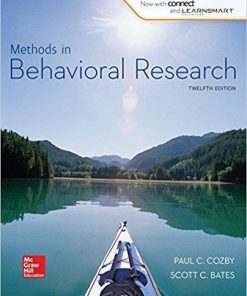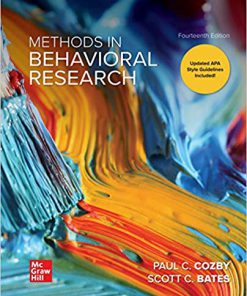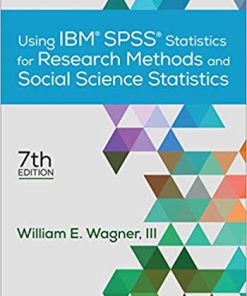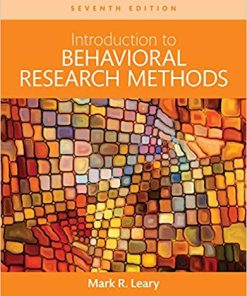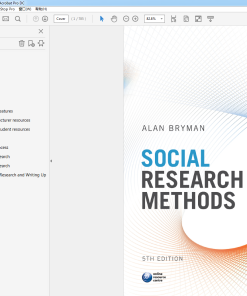(eBook PDF) Conducting Research: Social and Behavioral Science Methods 2nd Edition
$50.00 Original price was: $50.00.$35.00Current price is: $35.00.
(eBook PDF) Conducting Research: Social and Behavioral Science Methods 2nd Edition – Instant Download
(eBook PDF) Conducting Research: Social and Behavioral Science Methods 2nd Edition – Digital Ebook – Instant Delivery Download
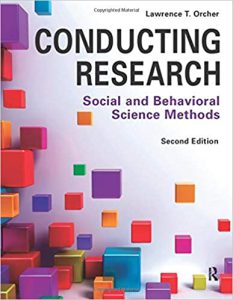
Product details:
- ISBN-10 : 9781936523191
- ISBN-13 : 978-1936523191
- Author: Lawrence Orcher
• Prepares students to conduct their first empirical research study, with quantitative and qualitative methods covered in detail. Common features as well as differences between the two research approaches are explored.
• While theoretical material is included, the emphasis is on providing practical, easy-to-follow advice on how to conduct a first research project.
• Unlike most texts with hypothetical examples, this text―with real examples written by a variety of published researchers―makes research methods come alive. Students see how research methods are used to explore important, contemporary problems.
• Factual Questions at the end of each chapter help students review key concepts covered in the chapters.
• Questions for Discussion encourage students to consider specific techniques and strategies that they might use while conducting their research.
Table contents:
SECTION I PREPARING A PRELIMINARY RESEARCH PROPOSAL
Introduction
Part A Getting Started
1. Selecting Tentative Topics for Empirical Research
2. Locating Literature and Refining a Research Topic
3. Preparing a Literature Review
4. Citing References in APA and ASA Styles
5. Writing Research Hypotheses, Purposes, and Questions
6. Selecting a Research Approach
7. Looking Ahead to Participant Selection
8. Looking Ahead to Measurement
9. Looking Ahead to Data Analysis for Quantitative Research
10. Looking Ahead to Data Analysis for Qualitative Research
11. Preparing a Preliminary Research Proposal
SECTION II REFINING THE PRELIMINARY RESEARCH PROPOSAL
Part B Issues in Participant Selection
12. Participant Selection in Quantitative Research
13. Participant Selection in Qualitative Research
Part C Issues in Measurement
14. Measurement in Quantitative Research
15. Writing Objective Measures
16. Measurement in Qualitative Research
Part D Techniques for Data Analysis
17. Descriptive Statistics for Quantitative and Qualitative Research
18. Correlational Statistics for Quantitative Research
19. Inferential Statistics for Quantitative Research
20. A Closer Look at Data Analysis in Qualitative Research
Part E Issues in Conducting Surveys
21. Issues in Participant Selection for Surveys
22. Issues in Measuring Demographics in Surveys
23. Issues in the Use of Questionnaires in Surveys
Part F Issues in Conducting Experiments
24. Introduction to Experimentation and Threats to External Validity
25. Threats to Internal Validity and True Experiments
26. Pre-Experiments and Quasi-Experiments
Part G Putting It All Together
27. Writing Reports of Empirical Research
Appendices
A. A Closer Look at Interpreting Correlation Coefficients
B. Focus Group Methodology in Qualitative Research
C. An Overview of Program Evaluation
D. Ethical Issues in Conducting Research
Sample Literature Reviews
1. Associations Between Marital Happiness, Problems, and Health
2. Effects of Random Student Drug Testing in High School
3. College Students’ Perceptions of Their Grandparents and Communication Technology Use
4. A Review of Interventions for Substance Use Among Homeless Youth
Tables
1. Table of Random Numbers
2. Table of Recommended Sample Sizes for Populations With Finite Sizes
Subject Index
People also search:
the 2nd step in conducting the marketing research is
2 methods of research
what is research conducted
5 reasons for conducting research
a conducting rectangular solid of dimensions
in conducting research for a report ashley made connections
a researcher conducting behavioral research collects

